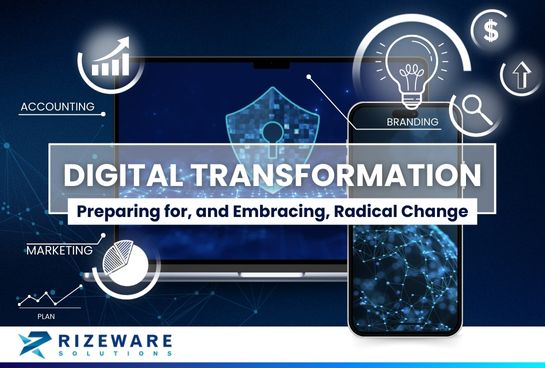
Preparing for, and Embracing, Radical Change

Erik Ruda
July 07, 2024
Digital Transformation Blog Series – Erik Ruda, CEO, Rizeware Solutions
Last week, we discussed the importance of starting your digital transformation journey with a clear vision, strategy, and set of measurable objectives. This is an essential first step on a journey that has become a strategic mandate for every forward-looking organization. That mandate explains why, according to Markets and Markets, total investments in digital transformation are projected to reach $3.1T by 2030.
As a reminder, and I promise this is the last time, here is our working definition of that term:
Digital transformation is the process of integrating digital technology into all areas of a business, fundamentally changing how it operates and delivers value to customers. It’s not just about adopting new technologies; it’s about reimagining business processes, culture, and customer experiences in the digital age.
That brings us to Step 2 on your digital transformation journey: managing change. Whenever you use the word “transformation” in a sentence, it’s probably a safe bet that you’re talking about something involving disruptive and sometimes even radical change. In fact, digital transformation is the very definition of radical change. This is why it can be frightening for many employees when their organization launches a digital transformation initiative.
This is totally understandable. Many employees and managers are comfortable with existing processes and established workflows. Digital transformation often disrupts these workflows and requires employees to adapt to new technologies. That resistance to change can quickly hinder the overall transformation process. Some employees might even fear that automation and new technologies will render their roles obsolete, leading to anxiety and job insecurity. Unfortunately, there is often a lack of understanding or awareness about the benefits and necessity of digital transformation, which further contributes to resistance.
For all these reasons, it is important to develop a change management plan that acknowledges employee concerns, anticipates potential resistance, and provides a process to address worries and minimize disruptions. Below is a summary of some of the best practices organizations have adopted to manage disruptive changes.
Create a Change Management Team
- A great starting point is to create a team responsible for analyzing every step of the digital transformation journey and identifying those areas where change could disrupt current processes. Ideally, team members would represent a cross-section of the company, with employees from multiple departments taking on this leadership role. From there, the team would develop and implement a plan to carefully manage the change process by providing ongoing communication, training, and support.
Include Employees Throughout the Process
- Before launching the initiative, talk to all employees about the importance of digital transformation to the growth of the business and the opportunity for each person to enhance their skill set and contribute even greater value to the organization. Address their concerns and ask for their feedback and ideas on specific areas where they see opportunities for business improvements. If you make them feel like key contributors to a successful transformation process, they will be more likely to embrace changes.
Implement Transformation in Phases
- A digital transformation initiative in many large organizations can be massive in scope and require a lot of time, people, and money. Because of its inherent complexity, consider breaking the entire project down into multiple phases – each with its own team leaders, timeline, budget, and success metrics. By achieving one success milestone at a time, it will be easier for employees to assimilate new processes, workflows, tools, and technologies.
Celebrate Success with All Employees
- Digital transformation is a marathon, not a sprint. Although there is certainly an amount of “strategic urgency” to complete the journey, it’s equally important to pause after completing each critical phase and encourage the entire team to embrace the success they have achieved together. Even a small office celebration at the end of a workday goes a long way to help every employee feel like a valued contributor.
Lastly, consider partnering with an organization that understands the process of planning and executing complex and customized digital transformation initiatives and can assist you in effectively managing both expected and unexpected changes along the way. In the meantime, we encourage you to follow Rizeware Solutions and share any feedback along the way.
Tell me what you think so far!
Official Info
-
110 SE 6th St., Suite 1761 Fort Lauderdale, FL 33301
(954) 204-0212 -
1610 R Street, Suite 300 Sacramento, CA 95811
(916) 536-6263
-
1700 Market Street, Ste 1005 Philadelphia, PA 19103
(215) 392-9522 - Centre Spaces la Rocade, Bir Kacem-Souissi 10100 Rabat - Morocco

